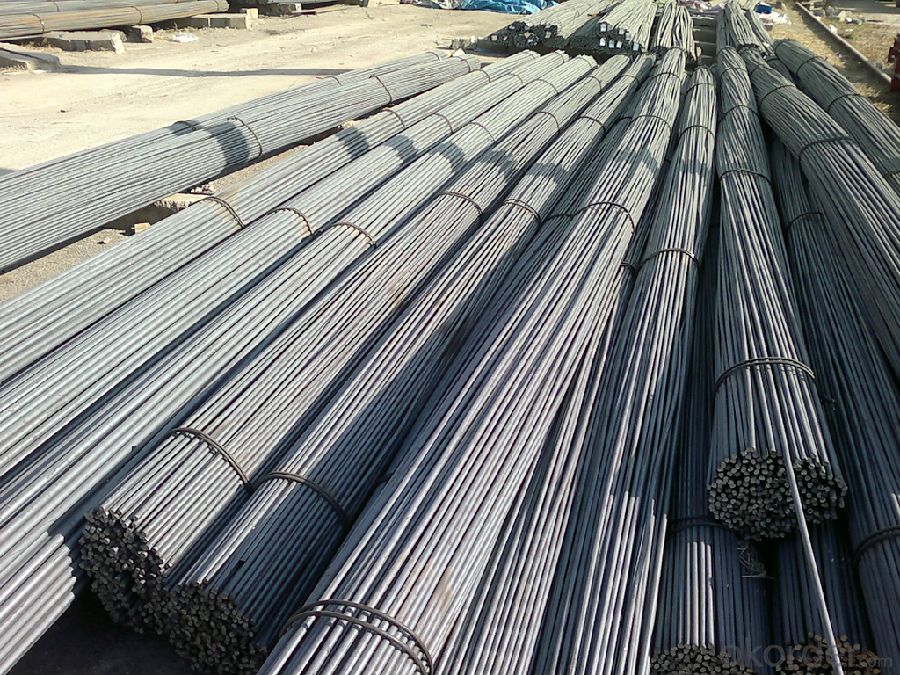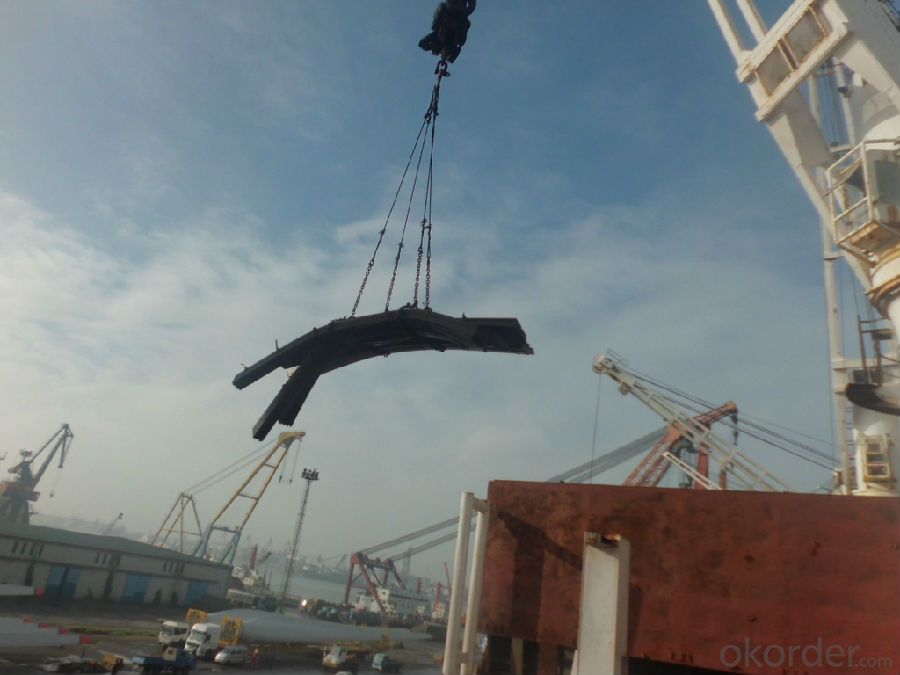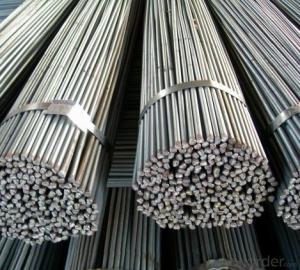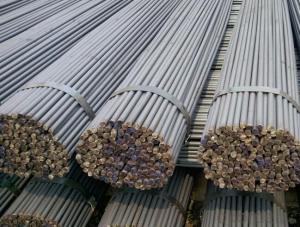Low Carbon Steel Round Bars with Variety Sizes
- Loading Port:
- China main port
- Payment Terms:
- TT OR LC
- Min Order Qty:
- 100 m.t.
- Supply Capability:
- 5000 m.t./month
OKorder Service Pledge
OKorder Financial Service
You Might Also Like
Product Description:
OKorder is offering Low Carbon Steel Round Bars with Variety Sizes at great prices with worldwide shipping. Our supplier is a world-class manufacturer of steel, with our products utilized the world over. OKorder annually supplies products to African, South American and Asian markets. We provide quotations within 24 hours of receiving an inquiry and guarantee competitive prices.
Product Applications:
Low Carbon Steel Round Bars with Variety Sizes are ideal for structural applications and are widely used in the construction of buildings and bridges, and the manufacturing, petrochemical, and transportation industries.
Product Advantages:
OKorder's Low Carbon Steel Round Bars with Variety Sizes are durable, strong, and wide variety of sizes.
Main Product Features:
· Premium quality
· Prompt delivery & seaworthy packing (30 days after receiving deposit)
· Can be recycled and reused
· Mill test certification
· Professional Service
· Competitive pricing
Product Specifications:
Manufacture: Hot rolled
Grade: Q195 – 235
Certificates: ISO, SGS, BV, CIQ
Length: 6m – 12m, as per customer request
Packaging: Export packing, nude packing, bundled
| ROUND BAR | |
| SIZE d(mm) | theoretical kg/m |
| 5.5 | 0.186 |
| 6 | 0.222 |
| 7 | 0.302 |
| 8 | 0.395 |
| 9 | 0.499 |
| 10 | 0.617 |
| 11 | 0.746 |
| 12 | 0.888 |
| 13 | 1.04 |
| 14 | 1.21 |
| 15 | 1.39 |
| 16 | 1.58 |
| 17 | 1.78 |
| 18 | 2 |
| 19 | 2.23 |
| 20 | 2.47 |
| 21 | 2.72 |
| 22 | 2.98 |
| 24 | 3.55 |
| 25 | 3.85 |
| 26 | 4.17 |
| 28 | 4.83 |
| 30 | 5.55 |
| 32 | 6.31 |
| 34 | 7.13 |
| 36 | 7.99 |
| 38 | 8.9 |
| 40 | 9.86 |
| 42 | 10.9 |
| 45 | 12.5 |
| 48 | 14.2 |
| 50 | 15.4 |
| 53 | 17.3 |
| 56 | 19.3 |
| 60 | 22.2 |
| 63 | 24.5 |
| 65 | 26 |
| 70 | 30.2 |
| 75 | 34.7 |
| 80 | 39.5 |
| 85 | 44.5 |
| 90 | 49.9 |
| 95 | 55.6 |
| 100 | 61.7 |
FAQ:
Q1: Why buy Materials & Equipment from OKorder.com?
A1: All products offered byOKorder.com are carefully selected from China's most reliable manufacturing enterprises. Through its ISO certifications, OKorder.com adheres to the highest standards and a commitment to supply chain safety and customer satisfaction.
Q2: what is the difference between actual weight and theoretical weight?
A2: All the section steel has two weights: actual weight and theoretical weight. Actual weight is the weighing out when the product delivered from the mill. Theoretical weight is calculated by pieces. The invoice can be based on each of them as your request
Q3: How many tons of steel products could be loaded in containers?
A3: Usually the steel products are delivered by bulk vessel because of the large quantity and the freight. However, there are no bulk vessel enter some seaports so that we have to deliver the cargo by containers. The 6m steel product can be loaded in 20FT container, but the quantity is changed according to the size, usually from 18tons to 25tons.
Images:


- Q:Can steel round bars be used for construction purposes?
- Indeed, construction purposes can make use of steel round bars. Several applications in construction commonly utilize steel round bars, including reinforcement in concrete structures, support for beams and columns, and as structural components in bridges, buildings, and infrastructure projects. The exceptional tensile strength and durability of steel render it a perfect option for construction purposes, capable of withstanding heavy loads, providing stability, and ensuring the longevity and safety of structures. Furthermore, steel round bars offer versatility, as they can be easily fabricated and customized to meet specific project requirements. Hence, due to their excellent mechanical properties, reliability, and cost-effectiveness, steel round bars find extensive use in the construction industry.
- Q:Can steel round bars be used in the construction equipment industry?
- Yes, steel round bars are commonly used in the construction equipment industry. Steel round bars are known for their strength, durability, and versatility, making them suitable for various applications in construction equipment. They can be used to manufacture components such as axles, shafts, pins, and fasteners. The high strength of steel round bars ensures that the construction equipment can withstand heavy loads and harsh working conditions. Additionally, steel round bars can be easily machined and welded, allowing manufacturers to create complex and customized designs for construction equipment. Overall, steel round bars are widely utilized in the construction equipment industry due to their exceptional mechanical properties and ability to enhance the performance and longevity of the equipment.
- Q:What are the different types of steel round bar surface finishes used in the aerospace industry?
- In the aerospace industry, there are several types of steel round bar surface finishes commonly used. These include: 1. Smooth Finish: This is a standard surface finish that is achieved through machining or grinding processes. It provides a smooth and polished surface, ensuring minimal friction and wear. 2. Brushed Finish: This finish is achieved by brushing the steel round bar with a fine abrasive material. It creates a distinctive linear pattern on the surface, enhancing its aesthetic appeal while maintaining a smooth texture. 3. Shot Blasted Finish: In this process, steel round bars are bombarded with small steel shots at high velocity. This results in a textured and slightly rough surface, which improves grip and provides better adhesion for coatings or paints. 4. Peened Finish: Peening involves impacting the surface of the steel round bar with small metal pellets or balls. This creates a dimpled texture, enhancing the material's resistance to fatigue and improving its strength and durability. 5. Anodized Finish: This is a surface treatment commonly used on aluminum alloys in the aerospace industry. However, it can also be applied to steel round bars. Anodization creates a thin, protective oxide layer on the surface, enhancing corrosion resistance and improving the material's appearance. These different types of surface finishes are chosen based on the specific requirements of the aerospace industry, considering factors such as durability, corrosion resistance, aesthetics, and functionality.
- Q:What is the impact strength of a steel round bar?
- The impact strength of a steel round bar refers to its ability to withstand sudden forces or shocks without breaking or fracturing. It is a measure of the material's toughness and resistance to impact loads. The impact strength of a steel round bar is influenced by various factors such as the composition of the steel, its heat treatment, and any additional alloying elements. The impact strength is typically determined through testing, such as the Charpy or Izod impact test, which involves striking a notched sample of the steel bar with a pendulum and measuring the amount of energy absorbed by the material before it fractures. The results are usually reported in terms of the energy absorbed in joules (J) or foot-pounds (ft-lb). The impact strength of a steel round bar can vary greatly depending on its grade or specification. Different grades of steel have different levels of toughness, with some being more suitable for applications requiring high impact resistance, such as construction, automotive, or heavy machinery, while others may be better suited for less demanding applications. It is important to note that the impact strength is just one of the many mechanical properties that need to be considered when selecting a steel round bar for a specific application. Other factors, such as tensile strength, yield strength, hardness, and corrosion resistance, should also be taken into account to ensure the optimal performance and durability of the steel round bar in its intended use.
- Q:What kind of material is the first round steel?
- [a round bar] is a smooth steel bar. The title of the old bar code, usually called HPB300, is a grade bar, H (Hot-rolled) means hot rolled, P (Plain) is smooth, B (Bar) is strip, where steel is used, and 300 represents yield strength of 300 MPa
- Q:What is the minimum tensile strength of steel round bars?
- The minimum tensile strength of steel round bars can vary depending on the specific grade or type of steel being used. However, common steel grades typically have a minimum tensile strength of around 400 MPa (megapascals) or 58,000 PSI (pounds per square inch).
- Q:How are steel round bars used in the construction of transmission towers?
- Transmission towers commonly use steel round bars due to their strength, durability, and ease of fabrication. These bars, typically made from high-strength carbon steel, come in various diameters to meet different structural needs. In transmission tower construction, steel round bars serve as the primary structural elements. They form the vertical and diagonal members that provide strength and stability to the tower. The bars are connected using welding or bolted connections to create the lattice structure of the tower. The round shape of the bars allows for even distribution of forces, making them ideal for handling the loads and stresses experienced by transmission towers. These loads include the tower's weight, electrical conductors, and environmental factors like wind, ice, and seismic forces. Moreover, steel round bars offer excellent corrosion resistance, which is crucial for transmission towers exposed to harsh weather conditions. This resistance helps extend the tower's lifespan and ensures the safety and reliability of the transmission lines. Additionally, steel round bars can be easily fabricated and customized to meet the specific design requirements of the transmission tower. They can be cut, bent, and shaped to the desired dimensions, providing flexibility in tower design and construction. In conclusion, steel round bars play a crucial role in the construction of transmission towers by providing strength, durability, and corrosion resistance. Their versatility and ability to withstand various loads make them an essential component in ensuring the safe and reliable transmission of electricity.
- Q:What are the advantages of using shock-resistant steel round bars?
- There are several advantages of using shock-resistant steel round bars in various applications. Firstly, shock-resistant steel round bars are designed to withstand high impact and shock loads, making them ideal for use in industries such as construction, automotive, and manufacturing. This property of shock resistance ensures that the round bars remain intact and maintain their structural integrity even under extreme conditions. Another advantage of shock-resistant steel round bars is their enhanced durability. These round bars are made from high-quality steel alloys that have been specifically engineered to provide superior strength and resistance to wear and tear. This makes them highly resistant to bending, cracking, and fracture, ensuring a longer lifespan compared to regular steel round bars. Additionally, shock-resistant steel round bars offer improved safety in applications where there is a risk of impact or sudden loads. By using these round bars, the likelihood of structural failure or catastrophic accidents is significantly reduced, providing a greater level of security for both workers and the overall operation. Moreover, shock-resistant steel round bars are known for their excellent machinability and weldability. This means that they can be easily shaped, cut, and welded to meet specific requirements, allowing for versatility in design and manufacturing processes. This ease of manipulation makes them a preferred choice for various projects where customization is necessary. Furthermore, shock-resistant steel round bars offer cost-effective solutions. Due to their high durability and resistance to wear, they require less frequent replacements, resulting in reduced maintenance and replacement costs. Additionally, their ability to withstand shock loads reduces the need for additional reinforcement or support structures, further reducing overall project expenses. In conclusion, the advantages of using shock-resistant steel round bars include high impact resistance, enhanced durability, improved safety, excellent machinability, and cost-effectiveness. These properties make them a reliable and efficient choice for a wide range of applications, ensuring long-lasting and reliable performance.
- Q:What are the different types of steel round bar alloys for improved strength?
- There are several different types of steel round bar alloys that are known for their improved strength. These alloys are developed through the addition of various elements to the steel composition, resulting in different properties and strengths. One commonly used alloy for improved strength is carbon steel. This alloy contains a higher carbon content, which enhances its strength and hardness. Carbon steel round bars are widely used in applications that require high strength, such as construction, automotive, and machinery. Another type of alloy is stainless steel, which is known for its corrosion resistance and high strength. Stainless steel round bars are often used in environments where corrosion is a concern, such as marine applications, food processing, and chemical plants. Alloy steel is another category that offers improved strength. This type of steel is created by adding elements such as chromium, molybdenum, and nickel to the composition. Alloy steel round bars are commonly used in industries that require high strength and durability, such as aerospace, oil and gas, and power generation. Tool steel is yet another alloy that provides enhanced strength and toughness. Tool steel round bars are specifically designed for machining and cutting applications, where high wear resistance and hardness are crucial. Lastly, there are specialty alloys such as nickel alloy and titanium alloy round bars, which offer exceptional strength and unique properties for specific applications. Nickel alloy round bars are often used in industries such as aerospace, chemical, and nuclear, while titanium alloy round bars are commonly found in aerospace, medical, and automotive industries. In conclusion, the different types of steel round bar alloys for improved strength include carbon steel, stainless steel, alloy steel, tool steel, and specialty alloys. Each of these alloys has its own unique properties and applications, providing a wide range of options for industries that require high strength materials.
- Q:Are steel round bars available in different shapes other than round?
- No, steel round bars are specifically designed and manufactured in a cylindrical shape.
1. Manufacturer Overview |
|
|---|---|
| Location | |
| Year Established | |
| Annual Output Value | |
| Main Markets | |
| Company Certifications | |
2. Manufacturer Certificates |
|
|---|---|
| a) Certification Name | |
| Range | |
| Reference | |
| Validity Period | |
3. Manufacturer Capability |
|
|---|---|
| a)Trade Capacity | |
| Nearest Port | |
| Export Percentage | |
| No.of Employees in Trade Department | |
| Language Spoken: | |
| b)Factory Information | |
| Factory Size: | |
| No. of Production Lines | |
| Contract Manufacturing | |
| Product Price Range | |
Send your message to us
Low Carbon Steel Round Bars with Variety Sizes
- Loading Port:
- China main port
- Payment Terms:
- TT OR LC
- Min Order Qty:
- 100 m.t.
- Supply Capability:
- 5000 m.t./month
OKorder Service Pledge
OKorder Financial Service
Similar products
New products
Hot products
Hot Searches
Related keywords































